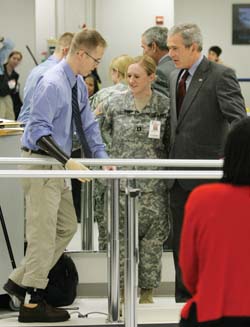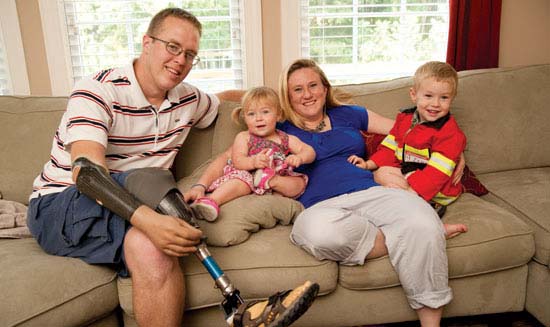 |
 |
| current issue |  | past issues |  | send a letter/news |  | address update |  | advertise |  | about us |  | alumni home |
Features
After War, LifePage 4 of 5
 AP Photo/Gerald Herbert PHYSICAL THERAPY: President George W. Bush and Dora watch as Scott demonstrates exercises at Walter Reed in 2007. |
They had the normal newlywed adjustments to make, and then some. They didn't know how to think about the future; even if Scott stayed in the Army, he wouldn't have the kind of career he'd always envisioned. And Scott didn't want to think about the past. While he was in the hospital, Ben Keating had died in Afghanistan. "It was an overwhelming event in what became a string of overwhelming events," Scott says. More and more people he'd served with were arriving at Walter Reed, wounded. In survival mode, he'd turned inward; it would be months before he could face his feelings about Keating.
As he worked toward independence, Quilty struggled to set priorities. While Walter Reed encouraged amputees to participate in sports, he wanted to deal with the hole the IED had blown in his life. "I couldn't have cared less about running the Army Ten-Miler if there wasn't a job at the finish line," he says.
So while still an outpatient, he took an internship with the U.S. Agency for International Development, trying to figure out what a civilian career might look like. By summer 2007 he could walk farther and better; by fall he was driving. That Christmas, Dora gave him a rock-climbing harness. You're going to climb again, she said. Scott thanked her but thought, "No way."
On an average weekday morning, everyone in the Quilty house is up by 5:30. Dora has the kids out the door by 7, to drop them at day care on her way to work. She misses working directly with patients as an occupational therapist, but for now while the kids are young, a contract job for Medicaid fits their lives better.
By 8 a.m., Scott has settled into his home office. He is director of business development for Fathom Creative, a Web design firm in Washington, D.C. Twice a month he makes the five-hour drive there for two days of meetings. "I never miss more than two bedtimes," he says.
After the explosion, people told him, "You've given enough." He felt he still had more to give, and the Army wanted him to stay. But stay as what? He explored both civilian and military options, looking for a job he'd find satisfying as he and Dora puzzled over how future deployments would fit with the family they hoped to have.
Then Scott got involved with Survivor Corps, an international nonprofit that helped survivors of violence. It was starting a U.S. program for combat veterans, and he became program manager. He met with Congressional leaders, was interviewed on CNN, spoke on the Capitol steps. He'd found a new way to serve. His separation paperwork from the Army came through in 2008.
When Dora was posted to Fort Bragg, N.C., they bought a house. They'd agreed that Dora would try to stay in the Army long enough to deploy, because that was something she really wanted to do. But by the time her unit departed for Afghanistan, Mackenzie was a newborn and Ian was 2. So Dora, too, reluctantly left the Army.
 Bryan Rierson AT HOME: The Quiltys with daughter Mackenzie and son Ian. |
Meanwhile, Survivor Corps had shut down and Quilty was debating his next move. His program had hired Fathom Creative to design its website, and he'd been fascinated by the process. He approached Fathom president Drew Mitchell with a proposition: Even though I live 200 miles from your office and don't know your industry, I could do a great job helping you find new clients. His confidence won Mitchell over.
"Scott is by far the most solution-oriented person I've ever met," Mitchell says. "His progress was fast and furious," learning software programs, connecting with clients, meeting and exceeding goals. Reinventing himself didn't scare Quilty; he'd done it as a nonprofit manager, as a platoon leader, and as a guy waking up to a new body.
Page: < Previous 1 2 3 4 5 Next >
Easy to print version
blog comments powered by Disqus

